Brinsley
Schwarz - October 2004
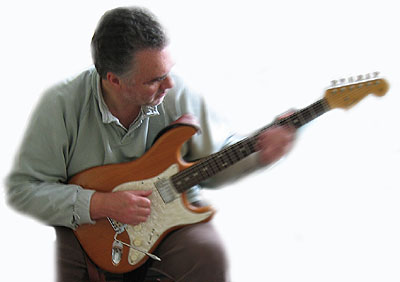
Pub rock, the
English roots rock movement of the early '70s, would never have earned a
cult following if it wasn't for Brinsley Schwarz. Following a disastrous
publicity stunt to promote its debut album, the band went into seclusion
outside of London and developed a laid-back, rootsy sound inspired by Eggs
Over Easy, an American band that had been playing a mixture of originals
and covers in English pubs. Heavily influenced by Crosby Stills & Nash
and The Band, the Brinsleys were a down to earth, self-effacing rock &
roll band. Between 1971 and 1974, Brinsley Schwarz toured England
innumerable times, playing pubs across the country. Along the way, they
established a circuit for similar bands like Dr. Feelgood and Ducks Deluxe
to follow. Though famous for launching Nick Lowe as an artist, the band
was named after its guitarist, Brinsley Schwarz, a hugely underrated
guitar player who went on to form the Rumour with Martin
Belmont. Brinsley currently divides his time between being head
guitar tech at Chandler Guitars and developing his own range of boutique
tube amps. Brinsley was kind enough to meet up with us at his home
in South West London recently to talk guitars…
So Brinsley,
what drew you to the guitar in the first place?
Definitely
hearing “Apache” by the Shadows. As a very young pre-teenager, I was
already into Elvis, Fats Domino and all the early beat stuff, but wasn't
particularly drawn by the guitar playing. Then I heard “Apache” for the
very first time and that was it.
Do you
remember your first guitar?
It was a cheap
nylon strung classical I got on my 13th birthday. My
parents said I had to have classical music lessons and show I could play
“properly” before I would get an electric guitar. I learnt “Apache”,
rhythm and lead, on the first day. Then I got a 12 string acoustic
and dabbled at folk (dreadful), before finally getting a red Hofner
Colorama and a Wem Westminster amp.
Who was the
big influence?
Obviously, Hank
Marvin to begin with, and lots of the English beat groups, the
Beatles, Stones, all the Liverpool groups, and the Beach Boys. I always
liked the Searchers and the Hollies (both had great rhythm guitar sounds),
and also Shane Fenton and the Fentones, that guy had a cool guitar sound,
and Johnny Kidd and the Pirates (Mick Green was the guitarist).
Later, I was
really influenced by Motown and Stax and early Ska and Reggae – I did the
coats and pulled coffee in a mod night club during school holidays for
about a year, so I heard “I Heard It Thru The Grapevine”' at least four
times a night!
The next really
big guitar influence was Robbie Robertson of the Band (and it was Garth
Hudson, also of the Band, who influenced my organ and sax playing). The
whole thing he seemed to be able to do was playing what was just right -
not too much or too little, rhythm stuff with little lead things thrown
in, and those short but very “to the point” solos. His guitar playing was
very much part of the song and his solos seemed part of the melody - when
I sing a band song to myself, I sing the solos as well. That's what I’ve
always tried to do, take what I play from the song and make it part of
it.
Hearing the Band
for the first time coincided more or less with the time that what was
known as beat or pop music in the sixties was being separated up into
different forms, and rock music was being born and referred to.
It was at this
time that I stopped listening to English music for quite a while. I was
never really caught up in the Clapton/Hendrix/Page/Beck thing, never much
liked any of the English rock giants - Yes, Who and all that - and I can't
stand more than 10 seconds of any Led Zeppelin. Early Cream, and Hendrix
singles, absolutely. Hendrix on “All Along the Watchtower” and Clapton on
“Crossroads” are wonderful, but from, I don't know, around '69, it all
went downhill for me and thank God for Crosby Stills and Nash and the
Band.
I was also
really greatly influenced by Little Feat (Lowell George and Paul Barrere),
Steely Dan, (and all of their guitar players), Ry Cooder, Albert King, Dr.
John, JJ Cale, Larry Carlton, Randy Newman and Robben Ford.
You're also
known for playing the saxophone, did you take that up at the same time as
the guitar?
I took up
playing sax in '73, I think. I was into Garth Hudson, Junior Walker and
King Curtis. When I once went into 'Footes' (major brass and woodwind
store in central London) for help, advice, a new beginner friendly
mouthpiece and reeds, the guy asked who I was into and when I told him, he
said 'they're not sax players' and walked off. Terrifically helpful!
That episode greatly changed my way of thinking and ever since I have
always thought to help any players less fortunate than myself.
Strange, though,
that I should be known for playing the sax. I only played for a few years
and was never very good. I was much more pleased with my Hammond Organ
playing and did a lot more of that and for longer!
Name us some
other saxophone-playing guitar players...
None that I know
of, except maybe Garth Hudson, he plays organ, piano, all the saxes,
accordion, lots of woodwind and brass, he's bound to be able to play the
guitar and probably better than lots of guitarists.
So tell us
how you hooked up with Nick Lowe.
I was in a local
Tunbridge Wells band and we fell out with the bass player (the band's
founding member) over musical differences. I had played with Nick at
boarding school and asked him if he wanted to join, and he did.
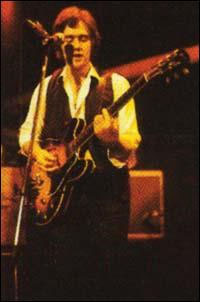 In hindsight, it looked like a masterplan to get "back to basics"
with Brinsley Schwarz, did it feel like that at the time?
In hindsight, it looked like a masterplan to get "back to basics"
with Brinsley Schwarz, did it feel like that at the time?
Yeah, we
deliberately halted the big country rock thing. Nick was starting to write
more intimate songs, and really starting to find his own style a
bit. A lot of the bands we were listening to were like that too, the
West Coast kind of thing – it all seemed to require that you listened to
each other. It really started when we played with Van Morrison in
New York, which was such an eye-opener. We’d never seen anyone play
like that before.
Up until that
point it seemed to be every band’s desire to get bigger and louder
equipment, and we were definitely going down that route. It wasn’t until
we heard Crosby, Stills & Nash, and the Band, that we started to waver
and realised there was something a little better going on.
So I don’t know
about a masterplan, but when we got back from the New York trip and we'd
finished the work that had resulted from the trip, we decided it wasn’t
really what we wanted – none of us, not even our manager, Dave
Robinson. So we got a house together outside London, started writing
and playing together every day, got smaller gear and just learned to
listen.
It's very
hard doing research on you via the web because the band was named
after you! Who made that decision?
After Bob
Andrews and Billy Rankin joined the band, and after we felt it was time to
change direction, management etc, we thought we should pick a new name. We
were to have a meeting where everyone would put forward their suggestions
and then we'd vote. When I arrived at Nick and Bob's flat, Billy was there
and they'd decided on the name 'The Brinsley Schwarz Band'. I did what I
could to persuade them that this was a bad idea, but they were
decided!
Was there
ever any resentment that it has increasingly come to be viewed as Nick
Lowe's band?
News to me, this
wasn't anybody's band, it was a band. We all had functions within the
band's life and we all felt that we were all as important as each other.
It's no good writing a song if there's no-one to lay down the beat or
someone to point out the bit that's no good. We all shared the
proceeds, including the manager and road crew. No resentment, I think we
were all 'happy to be doing what we were doing'
The band was
very much at the forefront of what became known as the "pub rock"
scene. Was that term accepted at the time, or was it entirely an
invention of the press?
'Pub Rock' was
an invented term, I don't know who came up with it first, but we stopped
playing pubs as soon after we became heralded as pub rock masters as was
possible. We were not happy playing big venues and wanted to get closer to
the audience, we played intimate little songs and didn't much suit the big
rock scene. We saw an American band, 'Eggs Over Easy', playing songs in a
pub, and liked them. We talked to them, they were just doing what
thousands of bands in the states were doing but no-one was doing it in
England. There wasn't a 'bar scene'. We had to practically beg landlords
in London to let us play, but it caught on and more and more venues opened
up. We started it and found a place to play where we were happy, for a
while!
Talking of
the press, a key early event for the band was the Fillmore East album
launch. Can you describe what happened?

Well it’s a
really long story, and it’s been written about many times (check the
liner notes on CD “Surrender to the Rhythm” and the book “No Sleep Till
Canvey Island”), from lots of different perspectives. But the
basics of it were that in those days you didn’t have much choice about
getting your name out there – you could pay to get on a major tour, or you
could try to do something different or one-off, that might elevate
you. That was the beginning of showcases really. But you had
to do something special to get noticed. Dave Robinson (Brinsleys manager,
ex Hendrix road manager and head of the Famepushers management company,
and later Stiff Records) asked everyone in the Famepushers group to come
up with an idea of something we could do. I don’t know who’s idea it was,
but the idea was to play the Fillmore in New York and invite the world’s
press. Everyone laughed and then of course it took hold. We
had record company interest, we couldn’t do the trip without record
company backing, and they wouldn’t sign us unless we did it, so it was
Catch 22.
So we did it,
and to us it was an amazing adventure, but of course the story’s nearly
unbelievable, if you tried to write it as a book people would think the
whole thing was completely unfeasible. Out of the event we got more, and
better paid, work, but we also learned that fame, and the media, is very
fickle. But we experienced some positive stuff too. American radio
in particular was a revelation – 30 minute batches of uninterrupted music,
Dylan, Hendrix, Van Morrison, The Band, Motown, really dynamite
music. Nothing like that in the UK of course.
What exactly
caused the press backlash from the gig?
Well it wasn’t
their fault really I suppose. Aer Lingus the airline have a lot of
responsibility really. Dave Robinson chose Aer Lingus as the airline
to fly the press to New York. When he was confirming the flights someone
from the airline said “Oh, is that for real? I thought you were joking”,
and this was considerably late in the day. So the plane that finally
arrived at Heathrow to pick up the press was not, how shall we say, fully
functioning… So it immediately developed a fault at Heathrow that took 3
hours to sort out. The journalists had already gone through customs, so
there was only really a bar to pass the time. Quite a lot of them had
flown a fair way to get to Heathrow in the first place, so they’d visited
a few bars already by that time. When the plane finally took off it
developed another fault and had to land in Ireland, where the airport only
really had a customs office and a bar. I think it ended up taking
them 17 hours to do the trip, so they must have got drunk and sobered up 3
or 4 times by the time they got to New York!
When they got
out of the airport there was a 20 Cadillac Limousine cavalcade with a 16
motorcycle police escort waiting to get them to their hotel. But it was
rush hour by this time, so they were really up against it to get to their
hotel, and get to the Fillmore, let alone have a relaxing time, which was
the original plan. 3 of them crashed and never made it, half of them
couldn’t be bothered and stayed in the hotel. We had bought the
front 3 rows of the theatre and got permission from the Fillmore for those
rows to use cameras, which wasn’t allowed then. The Fillmore
bouncers, who were pretty New York shall we say, had been told that only
the front 3 rows could use cameras, so once those rows were full up that
was that for the cameras. Well naturally, no-one cordoned off the
front 3 rows, so when the punters came in they took the seats. So
when the remainder of the press finally arrived people got bounced,
cameras got smashed, all the rest of it. So I don’t know how many actually
made it through the gig, but we got some pretty hefty hotel bills!
While all this
was going on we’d been having our own adventures. In those days you needed
to have an exchange band to get Musicians Union permission to play and get
the Visas. Love were our exchange band, and just as we were due to collect
our visas, they cancelled and our visas were refused. We had rehearsal
time booked at the Fillmore, so Dave said we were going to Canada, where
we’d be able to pick up visas no problem. So we flew to Canada, went
to see an extremely officious American visa guy, and started to fill out
the forms. Now the forms ask you if you’ve ever been refused a US visa.
Dave said “just say no”, so we did and signed up. After about an
hour this guy calls us up to his window and says “I’ve got a million
dollar computer back there that says you guys were refused visas, in
London, less than 24 hours ago. You guys wanna go to the USA? No
chance” and threw our passports and visa forms back at us! So we got stuck
in Canada for 2 days eating burgers and watching Star Trek.
Meanwhile lots of stuff was going on, a senator got paid, and finally it
all got cleared on the Friday morning. Of course we were playing Friday
evening, and hadn’t got any rehearsal. So we were told to go back to
the visa office under instructions to be truthful, and naturally, it was
the same guy. He was clearly really pissed off and kept us waiting another
hour while he had lunch. Well, we were a longed haired rock'n'roll band,
and back then that was a big deal.
While this was
going on the airport ground crew in New York went on strike! So
there were no passenger planes going into New York that day. We had
to charter this little 6-seater, and it was a nightmare flight, up and
down through the clouds for 2 hours, horrible. We landed at Buffalo
I think, and when we handed our passports to the pilot to clear customs he
just said “don’t worry about that I’ll say you’re American businessmen”.
If we’d known about that in the first place we’d have saved ourselves a
lot of trouble! But we were like “no, we want a bloody
stamp!”.
So got to New
York about 5pm and by 7pm we were on. That was the three of us
though – Billy (Rankin, Brinsleys
drummer) was a US citizen, so he’d flown
in on Tuesday like we were supposed to, and got his own limousine to the
hotel! He checked in and then took up the limo driver’s offer of a
night out. So he’s outside the hotel waiting for the car, and
there’s a bunch of other people, also waiting for cars. And this car pulls
up and someone jumps out and stabs the guy standing next to Billy.
Billy naturally freaked out completely at this point and ran back to his
room where he stayed for 3 days…
We had 2 shows
to do each night, Friday and Saturday. Friday was a nightmare, we
were all terrified and stressed out, I couldn’t hear anything because my
ears were blocked from the flight, and of course we were supporting Van
Morrison, who completely overawed us. By the last gig on Saturday we
actually did ok, we were more relaxed, got a groove going, and the
audience were enjoying it. Of course the press were only at the first show
on Saturday, so they missed all that.
When we got back
to England on the Sunday, some of our parents were there to greet us with
the front page of The Sun - “English Band Wastes £100,000 on farcical US
trip”. Half of the press had just written about the chaos, the few
that had written about the music were not that favourable. All
understandable under the circumstances, but considering we’d just found
out we weren’t as good as we thought we were it was a bit
painful…
We realised
pretty quick of course that if you say to a journalist “I’ll pay you to
come over to the States to review our band” they’re more than likely going
to write something negative, as anything glowing will look like you bought
the review.
How much did
this affect the band's popularity at the time?
Well, we
certainly gained considerable notoriety, which enabled us to get a lot
more and better paid work. You know that thing about “all publicity
is good publicity” is pretty true. Richard Williams of the Melody
Maker might have slated us, but at the management agency the phone was
ringing off the hook. On the Continent in particular we were a
supergroup.
But the big
thing that we all learnt was that fame is fickle and maybe not what we
needed or wanted at that time, We wanted to be a band and good, we'd
played with Van Morrison in New York and he and his band were good in a
way we didn't really known existed. And so we quit the fame/rock/glam
nonsense, moved into a big old house together and started to learn how to
play together, seriously. (Going back to the “being good thing”, later on
GP and the Rumour did a short tour with Kokomo, we used to watch the bands
we supported a lot, and one evening I went to the side stage where I found
Steve - Goulding, our drummer- watching with tears streaming down his
face. I asked if he was OK, and he told me that Kokomo's drummer was just
unbelievable. It was like a religious experience for him. We all had
those. I remember seeing Andy Fairweather Lowe after a Ry Cooder concert,
the Chicken Skin Music one, he was standing by his seat, unable to leave
and completely gobsmacked!)
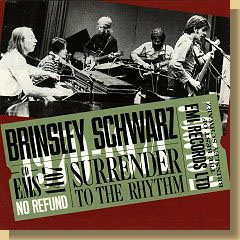
Looking back,
everyone pinpoints Brinsley Schwarz as one of the pivotal bands of that
era, you were certainly critically acclaimed (most of the time) and had
some powerful advocates (Paul McCartney etc). Why do you
think the band never really achieved their potential?
What WAS the
potential? We were certainly out of sync with the rest of the industry and
probably with mainstream musical tastes. I remember, in Germany,
people thought we were a 'pop' band because we didn't have hugely loud
distorting guitar sounds and most of our songs only lasted 3 or 4
minutes. “Marketing” wasn't in our vocabulary and we must have been
a nightmare for our record companies. But wasn't New Wave a rebellion
against all the self indulgences of '70's rock? We just got it early
and only a few fans were ready to hear it then. Perhaps, we never
really did justice to ourselves in the recording studio, although, looking
back, the records don't sound bad and some of the recent remasters sound
pretty good. We all lasted a pretty long time, though, we all came out of
it with our self respect intact and with a lasting respect from the
industry. And we've still got fans. Sounds OK to me.
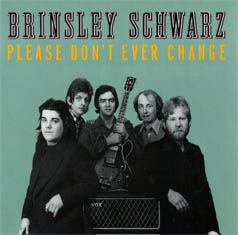
You had some
great contemporaries on the guitar and songwriting side, Wilko, Dave
Edmunds etc, and you did quite a few sessions in that period. Was
there a lot of collaboration going on? Who did you
rate?
As I said
earlier, I was not really into any English players during the early '70's.
I did like and learn from Dave Edmunds (he produced one of our albums in
'73/'74, and we supported and backed him on tour in the UK. He showed me
how to play Chuck Berry, properly!) I liked Tim Renwick and we hung
out occasionally and still do, but mostly we just got on with our
stuff. Later in the '70's, when the Rumour and Stiff Records started up, I
did a little session work with some of the Stiff artists, but the Rumour
was so busy that there wasn't really time for anything else. We hung out
with some of the bands we were touring with - Ace, Kokomo, Southside
Johnny and Thin Lizzy, who were all great bands.
We seemed to
tour a lot with Thin Lizzy, probably the only English rock band I liked
(well they played songs too) and I got to know Scott Gorham, whom I still
see from time to time. I knew Elvis and the Attractions, of course and Ian
Dury and the Kilburns, but there wasn't that much collaboration, I think
we were all too busy, and my favourites were still Americans, the Band,
Little Feat and Steely Dan, Ry Cooder and Randy Newman. Most of what I
wrote in the Rumour I wrote on tour, and we helped each other a lot on the
three Rumour albums.
Tell us about
hooking up with Ducks Deluxe and The Rumour.
When the
Brinsleys broke up in early '75, I had nothing, except my wife and two
kids, a guitar and amp and my share of the band's PA. After a failed
attempt at squatting in Chelsea near some of the guys from Chilli Willi
(they were a good band) we ended up moving back in with my folks, who were
always very supportive. I didn't know what to do, being in the Brinsleys
had been a bit like being married and I'd just got divorced. So I just
hung around, practised the sax a lot, sold all of the equipment and bought
a '60's Jazzmaster for £85. And a great top boost AC30 for £70. I remember
those prices, because I found the receipts not long ago in a box of old
stuff. The AC30 had the original blue speakers, which I took out and
chucked away, I put EV SRO's in instead!
Martin Belmont
had lived with us and roadied for us and he asked me along to jam with
Ducks Deluxe, which I did, we got on so when they asked if I'd like to
join, I did. Playing with Ducks Deluxe was a bit of an eye opener for me,
no laid back, sit in the groove and play the song, it was breakneck speed,
hell for leather and raw. But it wasn't long before they broke up
too.
Dave Robinson,
the Brinsleys manager and eventually a Stiff Records co-founder, had
installed an all valve recording studio upstairs at the Hope and Anchor
pub in Islington and was learning to use it by inviting groups of players
to record something. The first time he invited me along, the six
players were Graham Parker, a
singer/songwriter Dave had found; Martin Belmont of Ducks Deluxe; Steven
Goulding and Andrew Bodnar of Bontemps Roulez; and Bob Andrews and myself
from the Brinsleys. We recorded three tracks of Graham's, I think.
Afterwards, the five of us got to talking and decided that we'd got on
well together, so we arranged to loosely form a sort of “lets do some
playing together” band. So we got together weekday afternoons in a pub in
Peckham and after some months were getting to be a band. Meanwhile, Dave
had taken Graham's recordings around and had eventually secured a deal.
Since we were on the original tapes and were virtually a ready-made
backing band they asked us along.
We agreed to do
the album and tentatively one tour of the UK to promote it. That turned
into the five very busy years for what became Graham Parker and the
Rumour.

Graham Parker
and the Rumour were another "nearly huge" band. Martin Belmont's
given us his perspective on why it didn't really happen for the band,
what's your view?
Why Graham never
made it, I just don't know. Maybe, like the Brinsleys, we never quite got
it down on record. I definitely think we were let down by some producers,
(Nick Lowe being one exception on 'Stick to Me'). Maybe we were let down
by the record companies, I know Graham thinks that - listen to Mercury
Poisoning, it's not about liquid metal!. Who knows, once again, we all
emerged intact and better off. The Rumour's reputation is as good or
better than the Brinsley's and we all had a pretty good time most of the
time and did some great stuff. “Making it” isn't really that important,
that you're alive and happy is.
That whole
period, from late 60's to mid 70's is regarded as transitional between the
big bands of the 60's and the advent of Punk. The pub rock thing has
been pinpointed by many as one of the primary influences on the early Punk
bands, is that true? Did you like Punk when it was
happening?
I'd disagree
with that, there was plenty of good music around between 1969 and punk. I
didn't really see punk as a musical thing at all, rather a social
rebellion, and there were some pretty canny people around in the music and
fashion industries taking full advantage and making their
fortunes.
The only way pub
rock had anything to do with punk was that because of pub rock there were
places for punk bands to play. Pub rock, apart from being music played in
pubs, was definitely r'n'b based - real r'n'b, I mean, not what
masquerades as r'n'b now.
No, couldn't
stand Punk, worse than Led Zeppelin, if that's possible, and every bit as
appalling as House was! Sorry. I'm glad to say, I was too busy playing to
take much notice of it.
So The Rumour
split up in what, 80? 81? Why?
We split up in
'81. Graham had called a temporary but lengthy halt, we had carried on
without him and Bob Andrews, made another album and done some touring work
and I guess it just became time to do something else.
And what came
next for you?
For me, it was
the same as before when the Brinsley's broke up, except my kids were older
and we had a house, but the same removed feeling. So I just hung around.
Rod Stewart's people phoned and said Rod would like me to join the band,
but then Rod went walkabout and I never heard from them again.
I had bought
some guitar parts when I'd been in the States last (from Rudi’s in New
York). They were to build a Schecter Strat (when Schecter just made
replacement parts). I took them along to Chandler Guitars in Kew and asked
them to build it for me, but I also asked them if I could do the final
setup work in their workshop. When it was done, they all had a look and
Charlie Chandler asked me if I'd like a job repairing guitars. I started
doing a couple of days a week on the understanding that if I got called to
play, I would go, and that was fine.
Meanwhile Graham
had recorded his 6th album “Steady Nerves” in New York with some heavy
duty US session guys and was putting a touring band together. I had gone
over for a few months, trying to get into something, and had stayed with
our old US manager Allen Fry (you still out there Fry? give me a call). I
made a New York loft space into his new office virtually single handed -
built partition walls, a suspended ceiling, renewed all the electrics, the
lot. He was managing Graham and they needed the one right guitar player
for the tour and luckily I got the job.
So from then
until late 1989, I played on Graham's albums and toured with him - it took
up about 7 months a year - and the rest of the time I was doing more and
more guitar repairs at Chandlers.
As well as
playing with Graham, I produced two albums with him, “Mona Lisa's Sister”
and “Human Soul”, both in the late '80's. We toured every year, the rest
of the band were American for most of that time and it was an eye opener
to play with American guys, they do have a different approach.
Saying that,
those last two albums were with English players, - Andrew Bodnar from the
Rumour, and Pete Thomas from the Attractions (my favourite drummer I ever
played with). During the eighties I practically became Graham's live music
director. I remember one time strangely finding myself in the
position of trying to show Carlos Alomar how to play reggae rhythm guitar!
He just couldn't get it and we swapped roles in the end on that track -
“Don't Ask Me Questions”.
Then in 1990,
Graham wanted to do a record by himself and started using an American
backing band and so I stopped playing. I'd had enough of it by then
anyway, finding it increasingly impossible to set foot on an airplane and
wanting to be at home with my family, although my kids were about grown
up. I started working full time at Chandler Guitars and threw myself into
trying to make other people's guitars better than what I'd used.
In the mid '90's
I became intensely interested in guitar amp design and now offer mods and
rebuilds to old Fender amps. I am trying to get my own amp designs off the
ground and into the market place. They're tentatively called 'Road Runner'
Amplifiers. I have a workshop at home, where I do that and some guitar
repairs and I still do two days a week as head repairer at Chandler
Guitars.
My problem is I
don’t have a lot of time, and I seem to change my mind a lot!
Are you doing
anything musically these days?
Since I stopped
playing professionally, I have played occasionally with friends, often on
bass, which I enjoy.
I also have
enough material to record at least one album and I hope to start that
later this year - I'm excited and 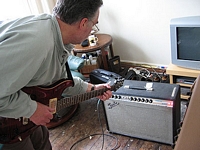 pretty apprehensive at the same time. pretty apprehensive at the same time.
Otherwise, I
love to just play. I have a couple of great acoustic guitars, an old
Martin and a Baby Taylor, or I take one of my electrics out to my workshop
and bash away through my “converted to complete tweed specs” silverface
Fender Champ (sounds terrific).
I also have a
Princeton, a Vibrolux, a Bandmaster, a Bassman 50 and a Twin Reverb, all
silverface, all modified. And I have a Marshall PA20 and a Groove Tubes
recording amp.
Still in
touch with Nick Lowe?
I occasionally
speak to Nick and Bob, although he's been in New Orleans for years now. I
keep in touch with Andrew, Martin and Steve from the Rumour, but I haven't
spoken to Graham for a while.
The twin
Rumour guitars of you and Martin produced some memorable moments live, did
you develop a complementary style, or was it just there?
Martin and I
didn't have to work at it too hard, we just seemed to naturally want to
play in a different place. We got on real well most of the time.
Check out us playing on the track “Empty Lives” on “The Up Escalator” if
you want to hear what I mean.
Martin mentioned the time with Thin Lizzy in New
York when everyone left after you guys finished. Did that ruin a
beautiful friendship?
No they just
rehearsed a bit harder before the next gig! I still see Scott Gorham and
he still remembers that one. You have to bear in mind we’d just been
through the Midwest with them, where it was really hard work for us, so it
was nice to see some fans and go down really well with an
audience..
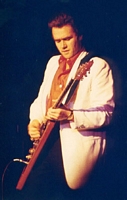 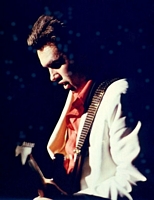 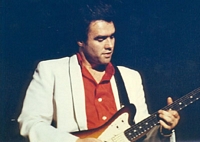
(Pics in
this section © copyright Ian Glendenning with
thanks)
How has your
style developed over the years?
I think there
was a definite time sometime around '77/'78, where a lot of the influences
started to come together and I reached my own style. Since then I guess
I've absorbed more and I've learnt quite a lot more about music,
gotten into Steely Dan chords and voicings, listened to an awful lot of
blues playing during the '90's and hardly any since. I suppose I just hear
the one thing that seems to be right to me in a song and then try to play
it. I hope I'm more melodic and more able.
You had a
deal with Hamer for a while didn't you?
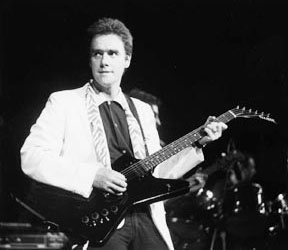 Yup, I did. One of the head guys, Jol Dantzig, came down to a
soundcheck in Chicago and showed us some guitars. I really liked one
of them and said I'd have it. Turned out it was his own and not for sale.
He said they'd make me one and I said no thanks, I just wanted that one,
so he sold it to me and I became an endorsed artist. Later they made a
black Explorer for me, one of the first all black guitars made, I was into
black then. And that was a great guitar.
Yup, I did. One of the head guys, Jol Dantzig, came down to a
soundcheck in Chicago and showed us some guitars. I really liked one
of them and said I'd have it. Turned out it was his own and not for sale.
He said they'd make me one and I said no thanks, I just wanted that one,
so he sold it to me and I became an endorsed artist. Later they made a
black Explorer for me, one of the first all black guitars made, I was into
black then. And that was a great guitar.
As a guitar
builder yourself, do you have any particular loyalties to a particular
guitar, or are you always in "I can improve it" mode?
Ah, the loaded
question! I'd say that, in general, guitar players have limited
knowledge of guitar construction and build quality and are quite often
biased by hearsay and legend. I know that this applied to me for a lot of
my playing life, but I got by for 15 years. I remember in 1978, I was
playing a Gibson Flying V, I loved it and it inspired me. One night one
the crew bashed it and broke a couple of the controls. We were in Boston
and it got taken to the big store there to be repaired. I went to pick it
up the next day, and it came out, fixed, but with a note from the repair
guy that it really needed a fret stone and a set up. Slightly miffed, I
airily dismissed this and went on my way. 10 years later, I had become an
experienced repairman myself and understood only too well what that guy
had
been saying. So, from the average guitar player's point of view,
most guitars, if they're working OK, are OK. But from a repairman's point
of view, they almost all need working on!
Taking
individual areas on guitars, and let's name names, I haven't seen a new
Gibson guitar since the early 80's that didn't need a fretdress or at
least a fret reprofile - why do they put square frets in their guitars?
They feel awful and can't play cleanly!
An awful lot of
guitar necks (and Fenders are prime examples) seem to like to bend around
the 15th fret, we call it a kick-up, it can cause bad fretting out if you
want to bend strings and have a lowish action. They need fretdressing but
half of Fender's guitars are made with little vintage style fretwire, one
fretdress and you've got very small frets and so it's even harder to bend
strings and more uncomfortable to play.
Ibanez are real
good at 'kickups' but at least they have big frets, so you've got
something left after a fretdress.
Can't understand
why Fender make so many Strat and Tele models, when really we all just
want the one... it looks and sounds like a 50's or 60's guitar but
suits modern playing. After all, no one was bending their top string
across the board in 1960.
Vintage reissues
sound right but don't play right and the modern models, like the Strat
Plus, can play right but don't sound right.
I could go on,
but I'll just say that after 23 years of guitar repairing, I'm not that
impressed with most of the major companies and have seen some pretty dire
excuses for an instrument and quite often from the expensive “custom
shops”.
The big
companies have become OK at producing lots of OK guitars at OK prices.
But there are
people out there making guitars under the “I'll make it as good as I can
and it costs what it costs” banner instead of the “there's a hole in the
market for a Strat or whatever at $499, what can we make?” I've
hardly ever seen a poorly made PRS, Tom Anderson or Taylor guitar, never
heard a pickup made by Lindy Fralin or Van Zandt that didn't sound really
toneful - there's lots of good people out there making good things, just
don't go by the name on the headstock, it doesn't mean much, except for
maybe the resale value.
I know quality
costs and also that high cost doesn't necessarily mean quality, but, in
general, I'd buy a PRS over a Gibson and a Japanese reissue strat over a
US one every time.
Does that go
for amps too?
I'll be in
trouble over this as well, but it's just my opinion.
Fender used to
make dynamite amps back in the 50's and 60's and even their 70's mess-ups
can be made to sound great, and they're all built like tanks.
Nowadays it's
all tiny components on crowded printed circuit boards, too many channels
and too much switching, too many LED's inside and little scratchy sounds
and questionable reliability. Amps with circuitboard mounted pots and
jacks are just a breakdown at a gig waiting to happen.
For tone, it
needs to be as simple as possible, components as big and good as possible
and the old circuits. I build an overdrive circuit based on the tweed
Deluxe, it has a gain, a tone and a master volume and it oozes fat silky
overdrive tone. Think of all those great old amps, the Deluxe, AC30,
Marshall PA20, AC15 etc. they all had one tone control!
Rob Bohner and I have proved to
ourselves, and to others, that the actual physical size of components
makes a difference in tone. We've changed out little stuff in newer amps
and put in old style, but same type and value, bigger components and heard
big tone improvements. And it's not like they knew better in the old days,
back then big components were the norm, so they were cheaper than the
small ones. Nowadays, with miniaturisation so important for computers,
it's the smaller components which are the cheapest. So that's what people
are using. Printed circuit boards with small components bring
manufacturing costs down. But for components, we're talking a few pence,
maybe a dollar or two per amp. I don't see the point, wouldn't most
players pay a touch more for good tone?
I'm still
modifying old silverface Fenders and my friend Rob Bohner still does his
great serious rocking mods to old Marshalls. We've done quite a few over
the years now and some for some not insignificant names as well. So if
you're wondering, at some time, how come that amp sounds so good, it just
might be one we've had our hands in!!
The vintage guitar market shows no
signs of slowing down, but values for "the usual suspects" seem almost
crazy these days. Where do you stand?
It depends how
you look at the vintage guitar market. I was watching one of those bargain
hunt auction programmes on TV recently and somebody paid over £300 for two
one inch high porcelain figures of Noddy and Big Ears - crazy! (Childrens
story book characters for those not into Noddy).
So as
collectable items, some guitars, amps and pedals are definitely worth
considering, although I'd say that returns on some, like a '50's Strat,
might not be too much anymore as the prices are now so high.
As playing
instruments, well for a start, would you take one out to a pub gig or let
an airline handle it for you on tour? Secondly, this whole idea that every
guitar made before 1965 is fantastic is just fantasy. True, there are some
great old guitars, but I've seen some pretty naff ones as well. They're
all made from wood and no two pieces of wood sound the same and handwound
pickups are not all wound the same, so it stands to reason that they made
some duff guitars then, just as they do now.
The really silly
thing about all of this is that the cause of it all was down to a big drop
in quality from Fender and Gibson in the '70's, people started to see that
the earlier instruments were better and so their second hand prices
started to rise.
Now, the '50's
and '60's stuff has become so expensive people have been paying higher
prices for those '70's guitars, whose poor quality caused the start of the
vintage guitar market. Now where's the sense in that?
The only reason
to pay house deposit prices for a vintage guitar is because it's more than
likely that it'll go up in value. I've got a '58 Les Paul Junior which I
bought a few years ago (part of my pension) and it has almost tripled in
value, it's a good guitar but I don't really like it that much.
For me, guitars
are made to play and if they play well and give you joy, then that's it,
no matter what the name on the headstock is, when it was made or what
colour it is.
Buying a vintage
guitar is so fraught with dangers nowadays as well, there are some very
good fakes around and I find it increasingly difficult to tell them apart.
Gibson and
Fender spotted the market a while back with the now standard reissue and
custom shop offerings, do you think their success is down to guitar
players being a backward facing bunch?
I don't think
we're necessarily backward facing, I think vintage guitars have an
inflated reputation and it's become accepted and unquestioned.
Guitar
manufacturers are just promoting and exploiting that. I've seen so many
guitarists (myself included) buy the wrong guitar because of the name on
the headstock or the colour. I'm just amazed that people haven't sussed it
yet. And there are things I just can't comprehend. Why would anyone spend
over the odds on a guitar that has been deliberately made to look old? Do
you see anyone popping into town to buy a new toaster and then asking for
it to have some burn marks and scratches added? Or would anyone buy a new
car and ask for it to be keyed, maybe break a headlight and put some
cigarette burns in the seat? And then you have people who fuss over
the smallest dent in their baby or spend hundreds converting to gold
parts, why? So that the gold plating, which is nowhere near as long
lasting as chrome or nickel, can become tarnished, pitted and wear off.
I've seen people
refuse a really good guitar and pick the next naff one because of the
colour. You can't see it when you're playing it! And worse of all, I don't
understand why people buy via mail order just to save a few quid. All
guitars are different from one another, one Strat will suit you and the
next 50 won't. I'd never buy an electric guitar without first trying it
through at least two different amps and in at least two different rooms.
Buy strings or a packet of biscuits mail order, yes, but never a
guitar.
Can guitars
evolve?
I can't see it
happening. Have any of the recent more radical designs taken off? PRS was
the last manufacturer to come up with something new that has lasted and
become successful, and that was partly because he reintroduced quality
into a stagnating poor quality industry. But Strats, Teles, Les Pauls,
335's, SGs, Martin acoustics, I don't see any of them ever going away.
It's astounding really, Leo got it right, the right body shape, the right
pickups, the right bridge, back in the 50's and despite years of technical
advances, it's still our favourite. And those early designs have also
survived years of mucking around with and bad manufacturing decisions. No,
Strats are here to stay, just like valve amplifiers!
Will guitar
players evolve?
I'm sure they
will, although I can't see where it might go. But then, I remember when
the guitar industry was getting scared of the “keyboard uprising” and that
nobody would need to play guitars anymore. Guitar heroes were a dying
breed, then Van Halen came along! There's still new stuff being done, for
instance the guys in Linkin Park sound pretty different to me.
But maybe, it
has all been done now, technically, and all that's left is for guitars to
be used towards the song, just back to where it started!
So what's
next for you?
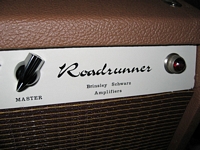 Well I hope to get my Road Runner amps out there.
They'll be point to point, hand wired and hand built. I use 'chosen for
tone' quality parts and there'll be three or four different circuits to
choose from in three or four power amp and amp type configurations. And I
hope to be able to sell for around half the price of a typical US made
boutique amp. You can’t really get one of those for less than £2,000. I'm
working on three Roadrunner models which are tentatively called
'Recording', 'Club' and 'Stage'. 'Recording' will be a single
channel small combo, about 20 watts, one ten inch speaker. 'Club' is about
40 watts one ten and one twelve, and 'Stage' 50 watts and maybe in head
and cab form. I have 4 preamp designs, two clean and two overdrive, one of
each with treble, middle and bass controls and the others with a Tweed
style single tone control, which is definitely my favourite way. The two
smaller amps will be valve rectified with the resulting softer feel and
less headroom. The two bigger amps will come with any two of the four
channels.There’s no switching inside at all, all the channel switching is
done via an A/B box, which allows you to use loops on the A/B box as well.
I think internal switching is damaging to tone. It's been a long and
sometimes painful process, but I'm just about ready to order transformers
and start speaking to people about building me chassis and cabinets, so
maybe I'll actually start producing soon. That'd be nice Well I hope to get my Road Runner amps out there.
They'll be point to point, hand wired and hand built. I use 'chosen for
tone' quality parts and there'll be three or four different circuits to
choose from in three or four power amp and amp type configurations. And I
hope to be able to sell for around half the price of a typical US made
boutique amp. You can’t really get one of those for less than £2,000. I'm
working on three Roadrunner models which are tentatively called
'Recording', 'Club' and 'Stage'. 'Recording' will be a single
channel small combo, about 20 watts, one ten inch speaker. 'Club' is about
40 watts one ten and one twelve, and 'Stage' 50 watts and maybe in head
and cab form. I have 4 preamp designs, two clean and two overdrive, one of
each with treble, middle and bass controls and the others with a Tweed
style single tone control, which is definitely my favourite way. The two
smaller amps will be valve rectified with the resulting softer feel and
less headroom. The two bigger amps will come with any two of the four
channels.There’s no switching inside at all, all the channel switching is
done via an A/B box, which allows you to use loops on the A/B box as well.
I think internal switching is damaging to tone. It's been a long and
sometimes painful process, but I'm just about ready to order transformers
and start speaking to people about building me chassis and cabinets, so
maybe I'll actually start producing soon. That'd be nice
I shall carry on
repairing, I specialise in refretting, setting up, custom innovative
wirings and in fretdressing, by hand - no German made computerised
fretdressing machines around me, it’s more vorsprung durch knowing what
I'm doing and what guitarists want!
I hope to record
an album and get it released, and I'll see where The Beautiful Losers take
me.
What’s your
current setup?
Main guitar is
my Strat, and my Thinline Tele as backup.
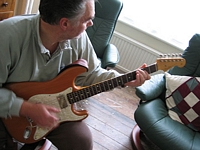
The Strat has a
lightweight alder body from Warmoth with a neck from a Fender Japanese '62
Reissue. The fingerboard is recambered to a 12 inch radius for a better
action, although I don't set up my guitars that low, - around 1.75mm
treble side to 2.25mm bass side - and refretted with Stewart
McDonald 149 fretwire, which is very similar to PRS wire. (this slightly
chunkier fretwire is what allows a guitar to feel comfortable to play but
with a slightly higher than average action, I think it's the difference
between fret height and action that's important, when that difference gets
too big, you have an uncomfortable guitar.) It has two PRS McCarty
humbuckers and the Deluxe 5 way switch allows some good wiring tricks.
How does the wiring work?
The 5 positions are:
- Neck
humbucker
- Neck
humbucker partially coiltapped - to give a slightly hot neck
Strat
pickup sound (very realistic).
- Both
pickups partially coiltapped - gives a cross between a Tele
middle
position and a Strat position.
- Bridge
humbucker partially coiltaped - more like a hot Tele bridge
than a
Strat bridge sound. (Don't you just love Tele Bridge pickups, when
they're a touch hot and have a nice warmth in the bottom end,
fantastic!)
- Bridge
humbucker.
It’s got partial
coiltaps, which I sussed out (maybe invented) about five years ago.
They’re achieved by using a resistor to ground from the junction of the
two coils, instead of a wire. The ordinary coiltapping wire dumps one
coil to ground, turning the pickup into a weak single coil, but the
resistor turns down the second coil (always do this to the inside coil)
instead, leaving part of it in circuit. This keeps the the pickup pretty
well hum cancelling, so no sudden single coil noise, and gives a fatter
much more realistic single coil sound. And you can tune your pickups to
the type of single coil you're trying to emulate by varying the resistor
value.
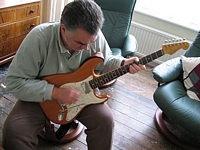
I once did this
to my PRS 22 fret Custom and got a pretty good Strat neck pickup sound,
this guitar and my current Strat often beat real and sometimes '60's
Strats in backs turned tests, so I think the idea works very well and
especially if you get into trying different resistor values.
Both tone
controls are masters, working on both pickups, but one has a small value
cap, a .0047uf, which rolls of just a little high end, producing a 'woody'
sound instead of a muffled one.
The tremolo
bridge was custom made, it's just like a vintage Strat bridge but with
Gibson string spacing (which matches the pickup spacing and also keeps the
strings in from the edges of the fingerboard a bit better), PRS saddles
and an aluminium block. Very important thing the trem block, the different
materials available do alter the sound and I prefer the less dense
aluminium, like on the PRS McCarty bridge and those old Gibson
'featherweight' stop tailpiece bridges. I think the lighter material gives
a less hard sound and produces more dynamics.
Lastly, I've
recently discovered 'Easy Mute', a company which produces an offset
tremolo arm, as used by Hank Marvin, which is much easier to use. They
also have a block insert and arm tensioning system which completely
eliminates trem arm wobble and rattle (for life) while leaving it as loose
or tight as you want. I sent my trem off to be done, it came back really
quickly, completely set up as it was, and with a great trouble free trem
arm, very impressive!
What about your amp setup?
My amp is my
first Roadrunner prototype. It has two independent channels.
Clean is my
version of Fenders '60's preamp. I've just made it a little more open
sounding tonally, and a bit more giving.

Overdrive is my
own design. All I can say is that I've aimed for Robben Ford and Larry
Carlton, so smoother than the high gain amps, and I've tried to keep
control of the bottom end, which I find is a failing in so many modern
amps. But it'll do blues and more traditional rock too.
Both channels
have their own valve driven parallel effects loops, mine are instrument
level, but line level is easy.
The amp is valve
rectified, has two 5881's giving just over 40 watts, five 12AX7's and one
12AT7. I use Sovtek or Svetlana valves.
What’s your view on NOS valves?
Don't believe in
the new old stock stuff, I've been burned too many times and so have some
of my friends. I
think Sovteks are just fine and you can always easily
and exactly replace them.
What speakers does the Roadrunner
use?
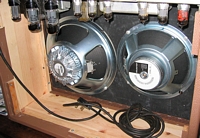 It has one ten inch and one twelve inch speaker. The ten
is a Celestion G10L35, which is surely one of the best 10" guitar speakers
ever made. Of course Celestion have discontinued it and now produce
something that isn't one of the best, in China! You should keep
accountants out of product decisions! It has one ten inch and one twelve inch speaker. The ten
is a Celestion G10L35, which is surely one of the best 10" guitar speakers
ever made. Of course Celestion have discontinued it and now produce
something that isn't one of the best, in China! You should keep
accountants out of product decisions!
I'm trying a
Celestion Century Vintage 30 at the moment, not too sure about that
yet. I really like Celestion Classic Lead 80's (one of Eric
Johnson's favourites) but I do appreciate the weight (or lack of it) with
the Centuries.
And effects?
My Effects board
utilises the fact that my amp has two independent channels and a loop for
each. I change channels via an AB box. But this also has two loops, one
for each amp channel.
On the clean
channel loop I have an MXR phase 45, which I use as a sort of chorus. I
don't like mono chorus and the phase 45 is a bit like a univibe.
There’s also a Boss VB2 vibrato, a Demeter Tremulator and a Fulltone
Fulldrive 2.
The overdrive
channel loop just has a Fulltone Fatboost, which I use to reduce gain to
the overdrive channel, cleaning it up a bit.
Each of the
amp's effects loops have a Boss DD2 and an SIB Echodrive mixed together, I
use the DD2's for a one hit short delay, a la Robbie Robertson's guitar or
John Lennons' vocal, and the Echodrives for longer multiple echoes. The
Echodrives are real valve driven echo machines and are truly marvellous,
the best I've heard, and, apart from anything else, sound very Hank
marvin! You can get them at Chandler Guitars.
So this is all
set up so that as I change channels on the amp with the one AB box switch,
the pre-amplifier loops and the echo loops change as well. This allows me
to preselect what effects I'm going to use on different parts of a song
and switch back and forth between them all with one footswitch. Sort of
like a midi set up, but without midi!
I use one of the
new Peterson pedal tuners and everything gets power from a Voodoo Lab
Pedal Power, which is very versatile and quiet.
Finally
Brinsley, if you could only own one guitar, what would it be?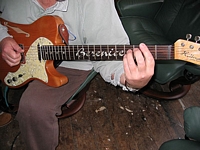 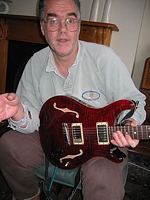
Ah, that would
depend on what I was going to be doing.
The best guitar
I have and my favourite is my PRS Hollowbody II. My Thinline Telecaster I
made myself from Warmoth parts with Van Zandt pickups and some special
wirings. It has my wife's name inlaid in pearl on the fingerboard, so I
have to keep that.
The Strat is my
“do all” guitar, so I'd have to keep that too.
We all need an
acoustic, so I'd keep my 66 Martin, and the baby Taylor for holidays.
So I couldn't
choose just one, it would have to be five, but if you push me, then I'd
keep my Thinline Tele. If I had to go out and buy one from scratch, it
would be a PRS Hollowbody 11.
Brinsley
Discography
We asked
Brinsley to pick his own discography based on what he was proud of from
his career to date.
Brinsley
Schwarz.
- Nervous
On The Road. (United Artists 1973)
- New
Favourites. (United Artists 1974)
- What
Is So Funny About Peace, Love and Understanding? (Hux Records
2002)
The
Rumour.
- Max.
(Vertigo 1977. Hopefully to be re-released soon with some live radio tracks on Hux)
- Frogs,
Sprouts, Clogs and Krauts. (Stiff Records 1978)
Graham Parker
and The Rumour.
- Stick
To Me. (Vertigo 1978)
- Squeezing
Out Sparks. (Vertigo 1979)
- The
Up Escalator. (Vertigo 1980)
Graham Parker.
- The
Mona Lisa's Sister. (1988)
- Human
Soul. (Demon Records 1989)
|